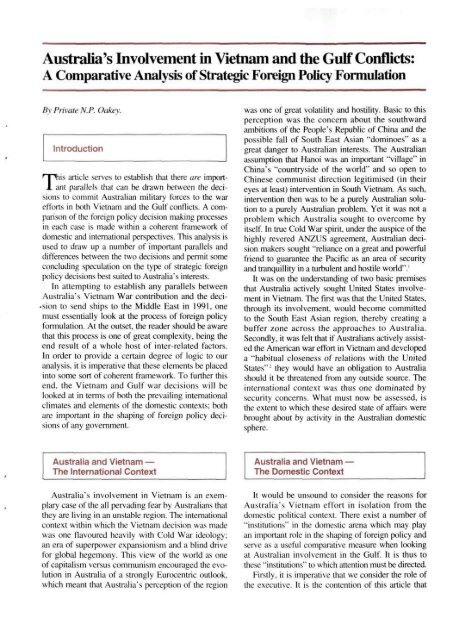ISSUE 107 : Jul/Aug - 1994 - Australian Defence Force Journal
ISSUE 107 : Jul/Aug - 1994 - Australian Defence Force Journal
ISSUE 107 : Jul/Aug - 1994 - Australian Defence Force Journal
Create successful ePaper yourself
Turn your PDF publications into a flip-book with our unique Google optimized e-Paper software.
Australia's Involvement in Vietnam and the Gulf Conflicts:A Comparative Analysis of Strategic Foreign Policy FormulationBy Private N. P. Oakey.IntroductionThis article serves to establish that there are importantparallels that can be drawn between the decisionsto commit <strong>Australian</strong> military forces to the warefforts in both Vietnam and the Gulf conflicts. A comparisonof the foreign policy decision making processesin each case is made within a coherent framework ofdomestic and international perspectives. This analysis isused to draw up a number of important parallels anddifferences between the two decisions and permit someconcluding speculation on the type of strategic foreignpolicy decisions best suited to Australia's interests.In attempting to establish any parallels betweenAustralia's Vietnam War contribution and the deci--sion to send ships to the Middle East in 1991. onemust essentially look at the process of foreign policyformulation. At the outset, the reader should be awarethat this process is one of great complexity, being theend result of a whole host of inter-related factors.In order to provide a certain degree of logic to ouranalysis, it is imperative that these elements be placedinto some sort of coherent framework. To further thisend. the Vietnam and Gulf war decisions will belooked at in terms of both the prevailing internationalclimates and elements of the domestic contexts; bothare important in the shaping of foreign policy decisionsof any government.was one of great volatility and hostility. Basic to thisperception was the concern about the southwardambitions of the People's Republic of China and thepossible fall of South East Asian "dominoes" as agreat danger to <strong>Australian</strong> interests. The <strong>Australian</strong>assumption that Hanoi was an important "village" inChina's "countryside of the world" and so open toChinese communist direction legitimised (in theireyes at least) intervention in South Vietnam. As such,intervention then was to be a purely <strong>Australian</strong> solutionto a purely <strong>Australian</strong> problem. Yet it was not aproblem which Australia sought to overcome byitself. In true Cold War spirit, under the auspice of thehighly revered ANZUS agreement, <strong>Australian</strong> decisionmakers sought "reliance on a great and powerfulfriend to guarantee the Pacific as an area of securityand tranquillity in a turbulent and hostile world".'It was on the understanding of two basic premisesthat Australia actively sought United States involvementin Vietnam. The first was that the United States,through its involvement, would become committedto the South East Asian region, thereby creating abuffer zone across the approaches to Australia.Secondly, it was felt that if <strong>Australian</strong>s actively assistedthe American war effort in Vietnam and developeda "habitual closeness of relations with the UnitedStates" 2 they would have an obligation to Australiashould it be threatened from any outside source. Theinternational context was thus one dominated bysecurity concerns. What must now be assessed, isthe extent to which these desired state of affairs werebrought about by activity in the <strong>Australian</strong> domesticsphere.Australia and Vietnam —The International ContextAustralia's involvement in Vietnam is an exemplarycase of the all pervading fear by <strong>Australian</strong>s thatthey are living in an unstable region. The internationalcontext within which the Vietnam decision was madewas one flavoured heavily with Cold War ideology;an era of superpower expansionism and a blind drivefor global hegemony. This view of the world as oneof capitalism versus communism encouraged the evolutionin Australia of a strongly Eurocentric outlook,which meant that Australia's perception of the regionAustralia and Vietnam —The Domestic ContextIt would be unsound to consider the reasons forAustralia's Vietnam effort in isolation from thedomestic political context. There exist a number of"institutions" in the domestic arena which may playan important role in the shaping of foreign policy andserve as a useful comparative measure when lookingat <strong>Australian</strong> involvement in the Gulf. It is thus tothese "institutions" to which attention must be directed.Firstly, it is imperative that we consider the role ofthe executive. It is the contention of this article that
















